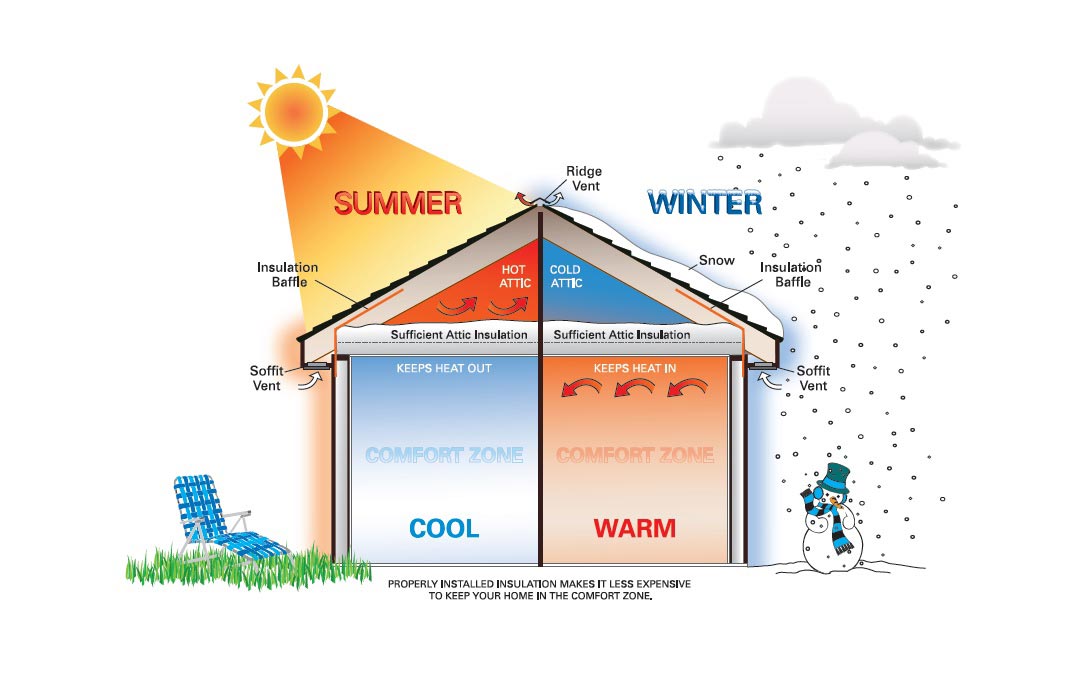Pulse of Information
Your source for the latest insights and updates.
Home Insulation: The Unsung Hero of Comfort
Unlock the secret to year-round comfort! Discover how home insulation transforms your living space and saves you money.
How Home Insulation Improves Energy Efficiency and Comfort
Home insulation plays a crucial role in enhancing energy efficiency, as it significantly reduces heat loss during the colder months and keeps your living space cool in the summer. By acting as a barrier against outdoor temperatures, well-insulated homes can maintain a more consistent indoor climate, which translates into lower energy bills. Proper insulation materials, such as fiberglass, spray foam, or cellulose, can make a substantial difference in your home's overall energy performance. By investing in effective insulation, homeowners can enjoy a reduction in their carbon footprint while also contributing to environmental sustainability.
Furthermore, home insulation contributes to greater comfort by minimizing drafts and cold spots within the house. Enhanced insulation not only helps maintain a stable temperature throughout each room but also improves indoor air quality by reducing moisture and preventing mold growth. As a result, homeowners can experience a healthier living environment that promotes well-being. In essence, the benefits of insulation extend beyond mere energy savings; it creates a more comfortable and enjoyable atmosphere for you and your family.

The Top 5 Types of Home Insulation: Which One is Right for You?
When it comes to keeping your home energy-efficient and comfortable, choosing the right type of insulation is crucial. Here are the top 5 types of home insulation to consider:
- Fiberglass Insulation: This is one of the most common types and comes in batts or rolls. It is effective for maintaining stable indoor temperatures, but proper installation is key to avoid air leaks.
- Foam Board Insulation: Rigid foam boards provide excellent thermal resistance and are often used in foundation walls, basement walls, or exterior sheathing.
- Spray Foam Insulation: Offering superior sealing properties, spray foam expands to fill gaps and can act as both insulation and an air barrier, making it a great choice for attics and crawl spaces.
- Cellulose Insulation: Made from recycled paper products, cellulose insulation is environmentally friendly and great for attics as it is blown in, creating a snug fit that reduces air leaks.
- Rock Wool Insulation: Also known as mineral wool, rock wool is fire-resistant and provides excellent soundproofing, making it ideal for both thermal and acoustic insulation.
Choosing the right insulation for your home can greatly affect energy costs and comfort levels. Consider factors such as climate, budget, and local building codes to make the best decision. For instance, if you live in an area with extreme temperatures, spray foam insulation may be the ideal choice due to its sealing properties. On the other hand, if you are looking for a budget-friendly option, fiberglass insulation can offer effective thermal resistance without breaking the bank. Evaluate your specific needs, and you'll have a clearer picture of which type of insulation is right for you.
Is Your Home Insulated Enough? Signs You Need to Upgrade Your Insulation
Proper insulation is essential for maintaining a comfortable and energy-efficient home. You might be wondering, is your home insulated enough? One of the first signs that your insulation may need an upgrade is a noticeable increase in your energy bills during the colder months. If you find yourself cranking up the heat but still feeling chilly, this could indicate that your insulation is inadequate. Additionally, areas of your home that are unusually drafty or rooms that never seem to reach a comfortable temperature are strong indicators that you should assess your insulation levels.
Another telltale sign is the presence of condensation or moisture on your walls or windows, which can lead to mold growth and structural damage over time. If you notice ice dams forming on your roof or uneven heating and cooling throughout your home, these can also signal that your insulation requires attention. To ensure your home remains safe and energy-efficient, consider scheduling an inspection to assess the current state of your insulation and explore options for upgrades that can improve your comfort and lower your utility bills.